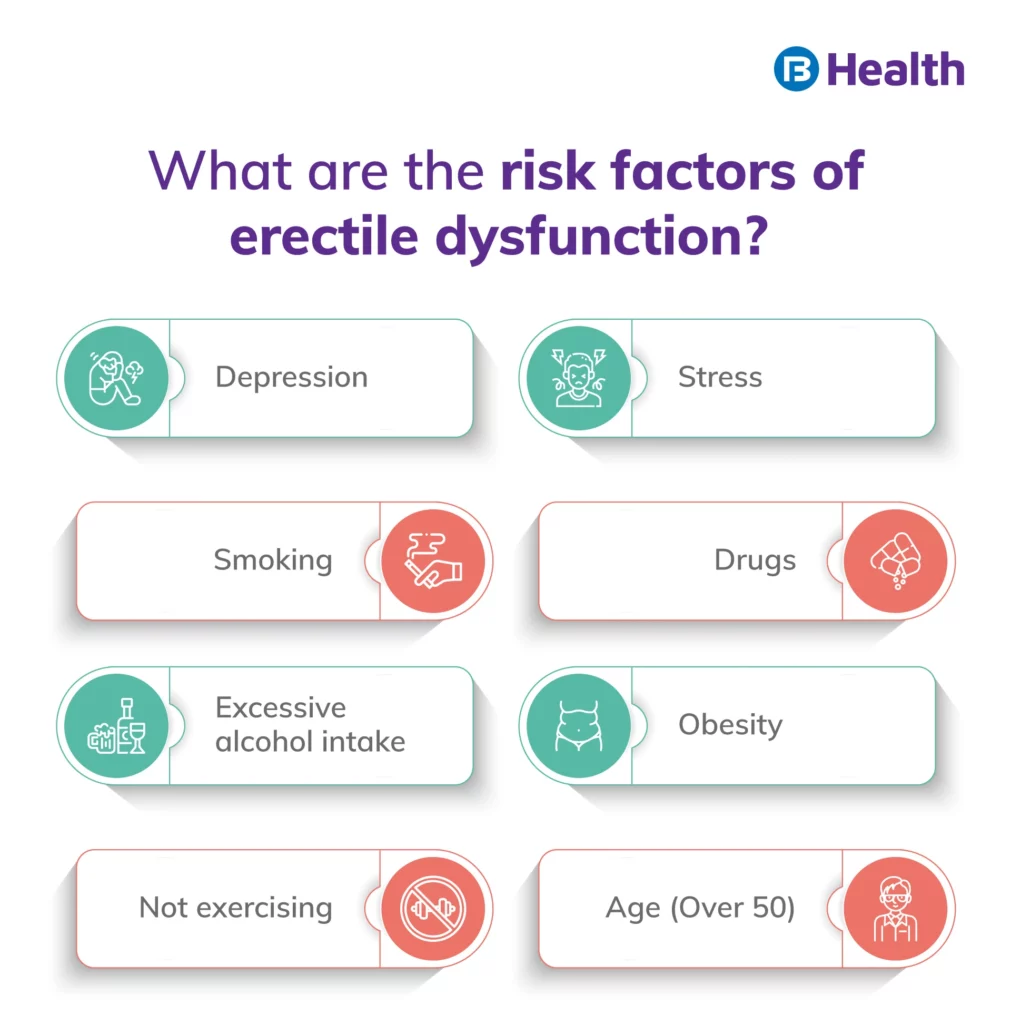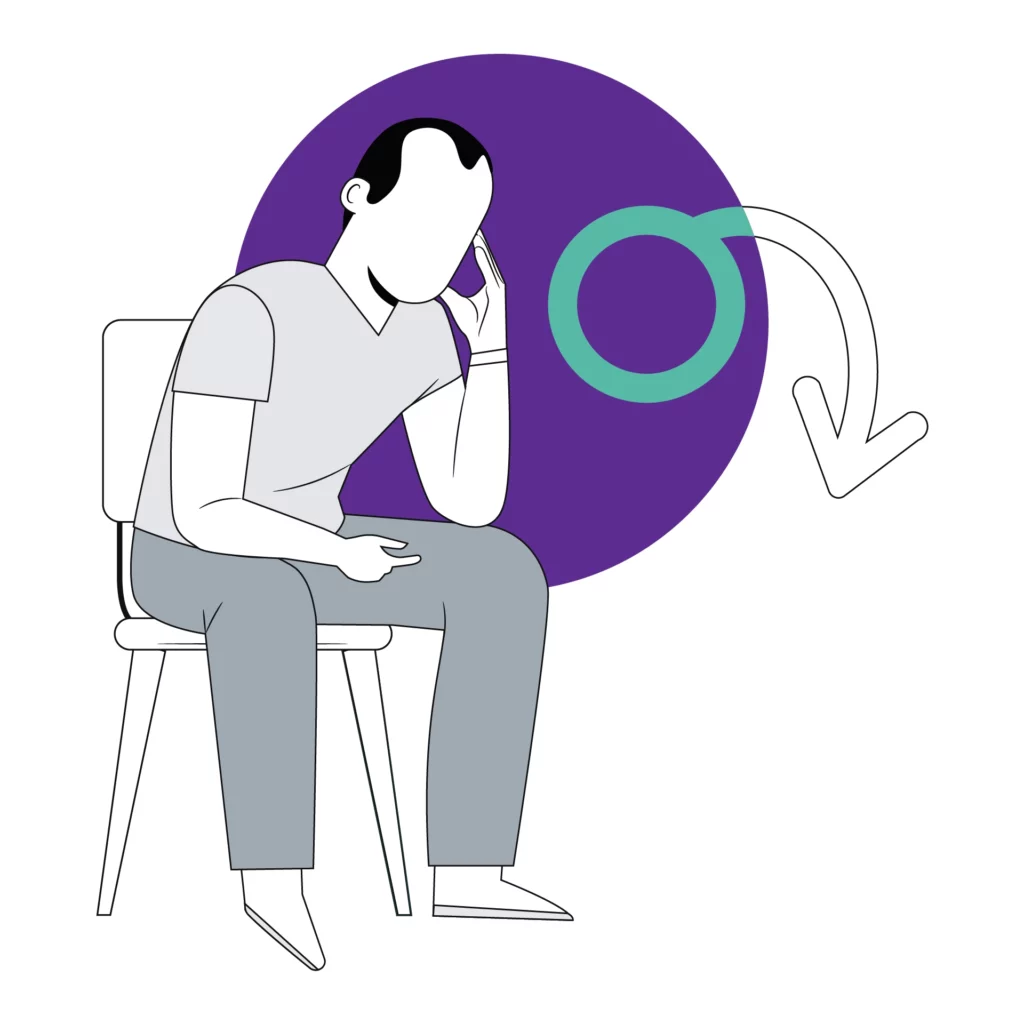General Health | 7 min read
Erectile Dysfunction: Emotional Causes, Symptoms, Complications
Medically reviewed by
- Table of Content
Synopsis
For many men, the inability to achieve or maintain an erection during sexual activity can be a frustrating and distressing experience. Although it's common for men to have erection issues occasionally, if it progresses or frequently occurs during sexual activity, it is a cause for concern and needs medical attention.
Key Takeaways
- Erectile dysfunction is a common problem experienced by men that worsens with age
- Various factors, including physical, psychological, and lifestyle-related issues, can cause erectile dysfunction
- Erectile dysfunction can sometimes be a symptom of other health issues such as cardiovascular disease, diabetes
Erectile dysfunction (ED) is a medical condition that impairs a man's ability to obtain and maintain an erection. ED can be intermittent or chronic. Its causes range from short-term heavy drinking and tiredness to long-term disease, trauma, or psychological issues. While experiencing ED can be aggravating, there are effective treatments present. Read ahead to gain a deeper understanding of erectile dysfunction and the available treatment options.
What Causes Erectile Dysfunction?
Health issues, emotional problems, or a combination can lead to ED. Here is some common erectile dysfunction causes:- Nerve damage
- Restricted blood flow in the penis
- Excess iron or hemochromatosis
- Heart disease
- High blood pressure
- High blood sugar
- Diabetes
- High cholesterol
- Cancer treatments administered close to the pelvis
- Certain medications can impair erections
Emotional Causes of Erectile Dysfunction
The mind and body must cooperate for healthy sex to occur. Depression, anxiety, relationship issues, stress at work or home, stress resulting from social, cultural, or religious conflicts, and worry about sex performance are some examples of emotional erectile dysfunction causes.
Early Signs of Erectile Dysfunction
Sexual problems that come and go are not necessarily a symptom of erectile dysfunction. But if the symptoms mentioned below continue, you might have ED. Take a look at the following:
- Absence of erections during nighttime and early morning
- Reduced desire for sex
- Failure to get and uphold an erection
- Softer erections
Erectile dysfunction disturbs most men at some point in their lives. It is not regarded as erectile dysfunction symptoms when they are only sporadic. However, if the condition worsens over time and consistently, there is likely a physical cause—which is typically the case with chronic erectile dysfunction.
Mental stress can also affect sexual excitement and can cause ED. However, anxiety, depression, stress, and other mental health-related issues can further worsen your pre-existing erectile dysfunction.Symptoms of Erectile Dysfunction
The most common erectile dysfunction symptoms are having issues keeping and maintaining an erection during sexual activity.
The following sexual conditions may be connected to ED:
- Premature ejaculation
- Delayed ejaculation
- Anorgasmia, which is the inability to experience orgasm despite significant stimulation
If you experience any of these symptoms, especially if they have persisted for three months or longer, go for a general physician consultation. They can assist in determining whether your symptoms are due to a condition that needs treatment.
How to Treat Erectile Dysfunction?
The mainerectile dysfunction treatment involves lifestyle changes. This includes giving up on some bad habits and embracing some healthy habits. To treat your erectile dysfunction, you may incorporate the below remedies into your daily routine.
- Maintain a healthy diet
- Lose weight
- Exercise regularly
- Reduce alcohol consumption
- Give up on smoking
- Have a sound sleep
- Get rid of stress
- Get counselling
If these remedies don't work, you must visit a doctor and take erectile dysfunction medicine as prescribed. It's also critical that you always consult your doctor before discontinuing any prescribed medication. Other than this, certain Ayurvedic treatments, like Gokshura benefits men’s health and reduces erectile dysfunction issues. It helps treat muscular weakness to make an erection stronger. Besides, it also has aphrodisiac properties that help increase sexual desire.
Additional Read: Ayurvedic Treatment For Erectile DysfunctionTalk therapy
ED may result from a variety of psychological factors, such as:
- Post-traumatic stress disorder (PTSD)
- Depression
- Anxiety
- Stress
Talk therapy might be helpful if you're going through psychological ED. Over several sessions, you can talk with your therapist about the following:
- Significant sources of stress or anxiety
- Your views on sex
- Subconscious conflicts that might be impairing your ability to enjoy sex
Vacuum pumps
An erection results from vacuum pumps as they draw blood into the penis. A vacuum pump device comprises the following parts:
- A plastic tube that you put on the penis
- A pump that draws air out of the plastic tube to create a vacuum
- An elastic ring for positioning at the bottom of your penis as you remove the plastic tube. The ring keeps the blood in the penis from flowing back into the body, helping to maintain the erection for 30 minutes

Alternative Ways to Manage Erectile Dysfunction
Kegel workouts
It involves quick motions to build up strength in your pelvic floor. First, recognize the muscles in your pelvic floor. Now that you know their locations, contract them for three seconds, then let them go. Do this exercise ten to twenty times in a row, three times daily, and repeat this exercise.
Aerobic activity
Exercise that varies from moderate to vigorous is helpful for your overall health. Moreover, it can facilitate blood movement, which might help treat ED. [2] Swimming and running are two examples of aerobic activity.
How to Diagnose Erectile Dysfunction?
A physical examination, a review of your health and sexual history, and other procedures can all be used to test ED. Here are a few ways to diagnose ED:
Physical exam
A physical inspection during which your medic will:
- Listen to your heart and lungs
- Check your blood pressure
- Examine your testicles and penis
- Look for signs of reduced blood in the pelvic region
- Examine the nerve zone in the pelvic region
- If necessary, recommend a rectal exam to check your prostate
Psychosocial history
Your medic will question your symptoms, medical background, and sexual past. Their assessment of the severity of your ED is dependent on your responses.
They might inquire about things like:
- How long have you been dealing with ED? Did it start slowly or suddenly?
- Do you ever struggle to ejaculate, experience orgasm, or feel sexual desire?
- What frequency of sex do you have? Has this frequency recently changed?
- How is the firmness of your erection?
- Do you experience erections when you wake up in the morning or in the middle of the night?
- How is your current bonding with your partner? What goals do you and your partner have for the relationship? Has anything changed recently?
- What prescription drugs do you currently take? Do you use non-prescription drugs, alcohol, or tobacco?
- Have you ever had surgery on your pelvic region? Do you have any underlying medical conditions?
Additional tests
To help diagnose your ED, your doctor might conduct additional tests. Tests may consist of:
- Ultrasound: An ultrasound gets done to examine the blood vessels of the penis
- Nocturnal penile tumescence test: A portable, battery-operated device to assess the quality of your nocturnal erections during the nocturnal penile tumescence test. The gadget gets positioned on the thigh. Your doctor can later access the data it stores
- Injection test: A drug is injected into your penis to induce an erection during the injection test. It enables your doctor to assess the erection's firmness and duration
- Urinalysis: Its purpose is to diagnose diabetes and other underlying medical conditions
- Blood tests: Blood tests for diagnosing diseases like diabetes, heart disease, thyroid problems, and low testosterone levels
These tests can assist your doctor in directing your care and figuring out whether an underlying condition may be the root of your ED.
Complications of Erectile Dysfunction
Multiple problems, both internal and external, can arise as a result of erectile dysfunction. Common ED side effects include:
- Stress and anxiety related to sex
- Low self-esteem
- Embarrassment and shame
- Fertility problems
- Relationship issues
- Depression
Risk Factors of Erectile Dysfunction
Erections may take much time to occur and may not be as strong as they once were. Erectile dysfunction can be caused by several risk factors, including:
- Mental health challenges like depression, nervousness, or stress
- Smoking
- Abusing drugs
- Excessive alcohol consumption
- Being obese and not exercising
- Being over 50
Men occasionally struggle to achieve or maintain an erection that is firm and long-lasting enough to provide an enjoyable sexual experience. Erectile dysfunction issues frequently come and go, but they can be alleviated by improving your general health. Men with medical conditions like nerve damage or a lack of blood flow to the penis may need medication for ED.
It is critical to remember the importance of professional care in treating erectile dysfunction. Some are serious, and delaying medical care only makes matters worse. Bajaj Finserv Health can help you find the right doctors to diagnose and treat ED problems. You can book an online appointment with a specialist from the comfort of your home and get the treatment you need.
- References
- https://www.health.harvard.edu/mens-health/which-drug-for-erectile-dysfunction
- https://www.ncbi.nlm.nih.gov/pmc/articles/PMC4291878/
- Disclaimer
Please note that this article is solely meant for informational purposes and Bajaj Finserv Health Limited (“BFHL”) does not shoulder any responsibility of the views/advice/information expressed/given by the writer/reviewer/originator. This article should not be considered as a substitute for any medical advice, diagnosis or treatment. Always consult with your trusted physician/qualified healthcare professional to evaluate your medical condition. The above article has been reviewed by a qualified doctor and BFHL is not responsible for any damages for any information or services provided by any third party.




